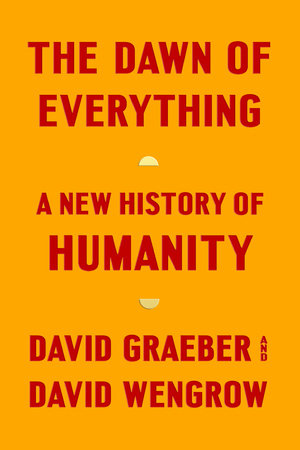The Dawn of Everything: A New History of Humanity by David Graeber and David Wengrow
The Dawn of Everything is now available at LeftWingBooks.net
NATIONAL BESTSELLER,NEW YORK TIMES BESTSELLER
Renowned activist and public intellectual David Graeber teams up with professor of comparative archaeology David Wengrow to deliver a trailblazing account of human history, challenging our most fundamental assumptions about social evolution–from the development of agriculture and cities to the emergence of “the state,” political violence, and social inequality–and revealing new possibilities for human emancipation.
For generations, our remote ancestors have been cast as primitive and childlike–either free and equal innocents, or thuggish and warlike. Civilization, we are told, could only be achieved by sacrificing those original freedoms, or alternatively, by taming our baser instincts. Graeber and Wengrow show how such theories first emerged in the eighteenth century as a conservative reaction to powerful critiques of European posed by Indigenous observers and intellectuals. Revisiting this encounter has startling implications for how we make sense of human history today, including the origins of farming, property, cities, democracy, slavery, and civilization itself.
Drawing on path-breaking research in archaeology and anthropology, the authors show how history becomes a far more interesting place once we learn to throw off our conceptual shackles and perceive what’s really there. If humans did not spend 95% of their evolutionary past in tiny bands of hunter-gatherers, what were they doing all that time? If agriculture, and cities, did not mean a plunge into hierarchy and domination, then what kinds of social and economic organization did they lead to? What was really happening during the periods that we usually describe as the emergence of “the state”? The answers are often unexpected, and suggest that the course of human history may be less set in stone, and more full of playful, hopeful possibilities, than we tend to assume.
The Dawn of Everything fundamentally transforms our understanding of the human past and offers a path toward imagining new forms of freedom, new ways of organizing society. This is a monumental book of formidable intellectual range, animated by curiosity, moral vision, and a faith in the power of direct action.
What People Are Saying
“This is not a book. This is an intellectual feast. There is not a single chapter that does not (playfully) disrupt well-seated intellectual beliefs. It is deep, effortlessly iconoclastic, factually rigorous, and pleasurable to read.” NASSIM NICHOLAS TALEB, author of The Black Swan
“Synthesizing much recent scholarship, The Dawn of Everything briskly overthrows old and obsolete assumptions about the past, renews our intellectual and spiritual resources, and reveals, miraculously, the future as open-ended. It is the most bracing book I have read in recent years.” PANKAJ MISHRA, author of The Age of Anger
“Graeber and Wengrow have effectively overturned everything I ever thought about the history of the world. A thorough and elegant refutation of evolutionary theories of history, The Dawn of Everything introduces us to a world populated by smart, creative, complicated people who, for thousands of years, invented virtually every form of social organization imaginable and pursued freedom, knowledge, experimentation, and happiness way before ‘the Enlightenment.’ The authors don’t just debunk the myths; they give a thrilling intellectual history of how they came about, why they persist, and what it all means for the just future we hope to create. The most profound and exciting book I’ve read in thirty years.” ROBIN D. G. KELLEY, Gary B. Nash Endowed Chair in U.S. History at UCLA and author of Freedom Dreams: The Black Radical Imagination
“The Dawn of Everything is the radical revision of everything, liberating us from the familiar stories about humanity’s past that are too often deployed to impose limitations on how we imagine humanity’s future. Instead Graeber and Wengrow tell us that what human beings are most of all is creative, from the beginning, so that there is no one way we were or should or could be. Another of the powerful currents running through this book is a reclaiming of Indigenous perspectives as a colossal influence on European thought, a valuable contribution to decolonizing global histories.” REBECCA SOLNIT, author of Hope in the Dark and Orwell’s Roses
“Not content with different answers to the great questions of human history, David Graeber and David Wengrow insist on revolutionizing the very questions we ask. The result: a dazzling, original, and convincing account of the rich, playful, reflective, and experimental symposia that ‘pre-modern’ Indigenous life represents; and a challenging rewriting of the intellectual history of anthropology and archaeology. The Dawn of Everything deserves to become the port of embarkation for virtually all subsequent work on these massive themes. Those who do embark will have, in the two Davids, incomparable navigators.” JAMES C. SCOTT, Sterling Professor of Political Science and professor of anthropology at Yale University and author of Seeing Like a State
“A fascinating inquiry, which leads us to rethink the nature of human capacities, as well as the proudest moments of our own history, and our interactions with and indebtedness to the cultures and forgotten intellectuals of Indigenous societies. Challenging and illuminating.” NOAM CHOMSKY
“Fascinating, thought-provoking, groundbreaking. A book that will generate debate for years to come.” RUTGER BREGMAN, author of Utopia for Realists
“Graeber and Wengrow debug cliches about humanity’s deep history to open up our thinking about what’s possible in the future. There is no more vital or timely project.” JARON LANIER, author of Dawn of the New Everything

Leave a Reply